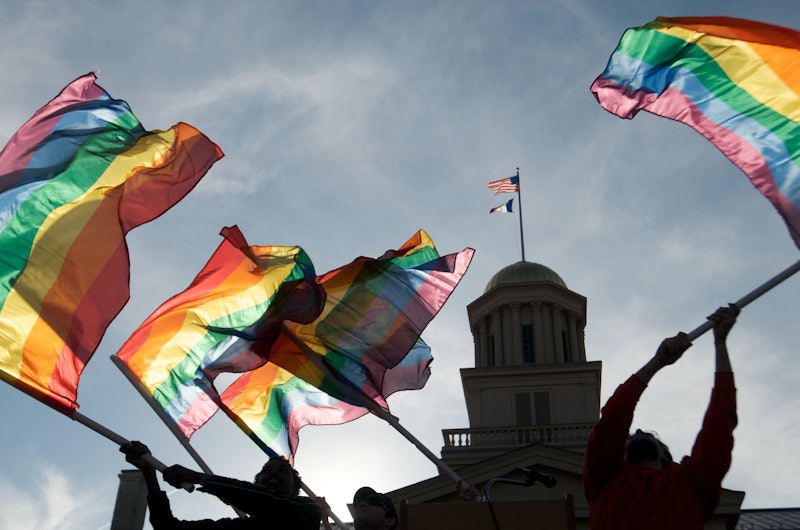News
Why Equal Pay Day Must Address The Discrimination Trans Women Face, Too

April 10 is this year's Equal Pay Day, an annual event raising awareness that women are, on average, paid less than men for equivalent work. Beyond the overall divide between cisgender men and women, however, Equal Pay Day also provides an opportunity to take an intersectional look at the pay gap, such as how Equal Pay Day is relevant to trans women.
Unfortunately, precise data on how much transgender women earn as compared to other groups isn't readily available. It's a question that's been somewhat understudied, which means the sort of cents-on-the-dollar unequal pay numbers you often see for women's earnings overall aren't concretely known for trans women specifically.
Some things are known, however, thanks in large part to the National U.S. Transgender Survey. Conducted in 2015, the survey found staggering economic disparities between transgender and cisgender Americans, numbers that suggest a community facing persistent hiring and employment discrimination.
Only 50 percent of transgender Americans worked full or part time for an employer, and their reported unemployment rate was 15 percent, approximately three times the national average in 2015. Furthermore, nearly one-third of all the survey's respondents ― 29 percent in all ― were living in poverty, more than three times the national average, and 12 percent of respondents earned no more than $10,000 in a full year.
Perhaps most tellingly, an overwhelming 77 percent of trans workers surveyed for the report said they'd taken steps to avoid mistreatment in their workplace, like hiding their true gender identity, or postponing their transition to avoid scrutiny and discrimination.
The survey does not specifically address what trans women earn, although it does highlight the increased hardships faced by trans people of color. Given that women historically earn less than their male counterparts, however, it's no stretch to conclude this is likely even more true for trans women, as well. In fact, as the Center for American Progress noted back in 2012, one study showed that trans women's earnings dropped by almost one-third while undergoing their transitions.
Vivian Taylor knows these issues all too well. A public policy grad student at Duke University, she lived through the passage of North Carolina's anti-trans bathroom bill, House Bill 2.
Passed back in 2016, HB2 required any trans person using a bathroom in a government building to use the one that matched the sex listed on their birth certificate, rather than their gender identity. The law has since been repealed, but its passage sent shockwaves through the state, and reportedly cost it billions of dollars in corporate investments.
It was also, as Taylor tells Bustle, promoted by anti-LGBT lawmakers primarily through trans-misogyny, stoking panic among cisgender North Carolinians that allowing transgender people to use the correct bathrooms was a public hazard.
“One hundred percent of the arguments for the North Carolina bathroom bill were the argument that transgender women were men, were probably sex predators. That was the entire argument," Taylor says.
In the aftermath of HB2’s passage, some companies opted to boycott the state to distance themselves from the discriminatory agenda. Since it was repealed, some companies (though not all) have started returning some of their business to the state. According to Taylor, however, companies making new hires in North Carolina in HB2's aftermath have been making a big oversight.
“None of those jobs went to transgender women,” Taylor says. Last year, she detailed the extent of the problem in an op-ed for The Herald-Sun, the city of Durham's daily newspaper. She wrote that in addition to ostensibly trans-friendly private companies failing to hire trans women, as of August 2017, many of North Carolina's LGBT rights organizations were also absent trans women employees.
"We can't talk about equal pay in the workplace if transgender women don't have a place in the workplace," Taylor says. "The fundamental issue is that trans women are in some cases, in many cases, being totally excluded from parts of the economy. And when that includes the universities, and the non-profits, and the LGBT organizations, it suggests how much transgender women might be being excluded in other places."
If you're a cisgender person, and you find yourself wondering what to do to help elevate trans women's issues, Taylor believes looking at what happening in your immediate vicinity is the place to start.
"The most important thing anyone can do, trans, cis, or otherwise, is take a good hard look at their own place of employment," Taylor says. "Ask, are the institutions in my personal life including trans women? ... Do any of the places where I've ever worked, have any of them ever employed one single transgender person? Especially one single trans woman, or one single trans woman of color."
She added, "I think that people just have to be willing to ask themselves these sort of hard questions."